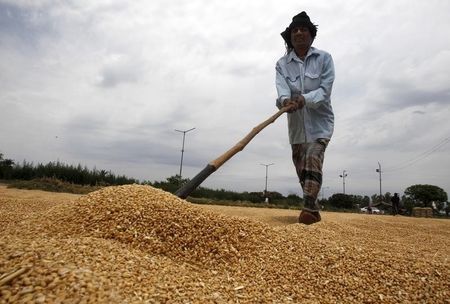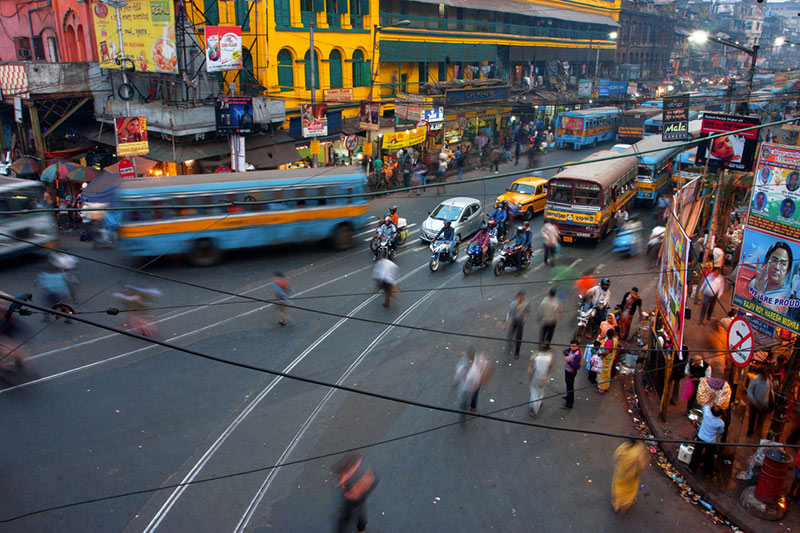By Manoj Kumar and Mayank Bhardwaj NEW DELHI (Reuters) - With grain silos spilling over, exports on the rise and an avowed market champion for prime minister, India's threat to trash a global trade deal in the name of food security appears puzzling.
But government officials say Prime Minister Narendra Modi is prepared to brazen out global outrage to seize a historic opportunity to build a rural power base with his defense of farm subsidies and to banish memories of humiliating national food shortages.
Modi triumphed in general elections only two months ago, but polls are never far away in the world's largest democracy and his Bharatiya Janata Party has its eyes already on new campaigns in the breadbowl states of Haryana and Maharashtra.
More than two-thirds of 1.26 billion Indians live in rural areas and Modi's party, traditionally stronger in the cities, needs to secure more farmers' votes to consolidate its power.
Party officials are confident New Delhi's tough line at World Trade Organization talks in Geneva will accomplish that.
"A strong stance in Geneva sends a message to the farmers and poor people that unlike the (last government), Modi can take on the global powers to safeguard the interests of rural India," said a party lawmaker, who declined to be named.
Modi's government demanded a halt to a globally agreed timetable on new customs rules and said a permanent agreement on food stockpiling and subsidies must be in place at the same time, well ahead of a 2017 target agreed last December in Bali.
Critics say India's brinkmanship threatens a deal that could add a trillion dollars to global prosperity and create 21 million jobs.
With a key deadline on Thursday looking increasingly tricky, Modi risks alienating allies including the United States, whose top envoy John Kerry is due in New Delhi on Wednesday for talks that will be in the shadow of the row.
If India goes through with its threatened veto, critics say it would cripple WTO talks, hasten trade negotiations elsewhere – something that India opposes – and swiftly trigger trade disputes challenging India's stockpiling policy.
ASSERTIVE INDIA
But the gambit is paying off at home where the opposition, industry chambers and many economists welcome India asserting itself more on the international stage.
"Modi like any good strong leader is committed to 'India first', that was his campaign," said Samir Saran, of the Observer Research Foundation think-tank.
India rejects international criticism by saying that it is responsible for the wellbeing of a quarter of the world's poor and that its subsidy burden is vastly overestimated.
Current WTO rules limit subsidies to farmers in developing countries to 10 percent of the total value of agricultural produce based on 1986-88 prices. New Delhi is asking for the formula to be adjusted for inflation and fears that if the Bali trade facilitation deal is signed by July 31 as planned, the questions of stockpiling and subsidies will end up on the back burner.
India provides subsidized fertilizer and seeds to farmers and buys wheat and rice from them at fixed prices to boost output, build stocks for welfare plans and meet any emergency.
The incentives, coupled with good rains over the past few years, have sent output soaring and state warehouses overflowing.
As of July 1, India had 21.2 million tonnes of rice and 39.8 million tonnes of wheat stockpiles, more than double the respective buffer norms.
Yet New Delhi is determined to hold on to these vast reserves, partly because of painful memories of dependence on U.S. food aid in the 1960s. Furthermore, as recently as 2006, India's surpluses vanished after two years of drought and it was forced to import grains, sending global food prices rocketing.
Monsoon rains are expected to be below average this year.
"India cannot afford to rely on imports of rice and wheat as no one produces (enough) to feed a county of India's size," said a senior farm ministry official. "Two successive droughts in India will scare the world market and prices will surge in an unimaginable way."
REFORMS STILL ON?
Government experts say nearly half of about 60 million tonnes of grains set aside for distribution at subsidized prices is siphoned off by corrupt officials, raising the question why India would burn bridges to defend such a inefficient system.
Still, some experts say India's best choice might be to simply try to improve it - since a change to cash transfer subsidies recommended by many economists will take years in a country with few rural banks.

India's nation-sized states are working to fix the system of warehouses and ration shops that dates back to the famines of the 1960s, emulating simple solutions adopted by states that have dramatically cut waste and improved delivery.
"The public distribution system has been making slow but steady improvement," Peter Kenmore, the United Nations' Food and Agriculture Representative in India, told Reuters.
"It is slow, sure, too slow, but basically the PDS is straightening out," he said, adding that FAO's position is that India's food subsidies do not distort global markets.
(Additional reporting by Mayank Bhardwaj and Frank Jack Daniel; Editing by Frank Jack Daniel and Tomasz Janowski)
